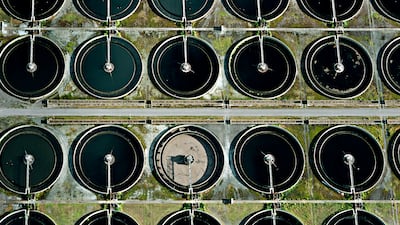The UK Health Security Agency (UKHSA) has declared a national incident after routine wastewater surveillance in London found sewage containing traces of polio.
The finding at Beckton Sewage Treatment Works is the first sign since the 1980s that the virus could be spreading in the UK, although the agency said no cases had yet been detected.
It also moved to calm concerns over the risk of infection given Britain's high vaccination rate against the disease, which causes paralysis in children in less than 1 per cent of cases.
The agency nevertheless encouraged parents to make sure their children were vaccinated, particularly those who may have missed shots during the coronavirus pandemic.
Nationwide vaccination levels are above the 90 per cent needed to prevent outbreaks but London's coverage rates among those under 2 years of age has dipped below that in recent years.
The UK's National Health Service in the city will begin contacting the parents of children under 5 who are not immunised, and the UKHSA is continuing investigations into community transmission.
Polio, spread mainly through contamination by faecal matter, used to kill and paralyse thousands of children around the globe every year. There is no cure, but vaccination brought the world close to ending the wild, or naturally occurring, form of the disease.
During the early 1950s, the UK was rocked by a series of polio epidemics, with as many as 8,000 people suffering paralytic poliomyelitis.
The epidemics ended with the introduction of the live oral polio vaccine in 1962.
Vaccine-transmitted infection
The UKHSA said it usually found between one and three samples of poliovirus in sewage annually, but they have previously been one-offs.
This year, one sample was found in February at the Beckton Treatment Works in East London and there has also been continued detection at the same plant — which serves about four million people — since April.
In the past, the detections occurred when a person vaccinated overseas with the live oral polio vaccine, which contains a live strain of the virus, returned or travelled to the country, and briefly shed the virus in their faeces.
The UKHSA believes this is also what happened this time, with the key difference being that the virus has also probably spread between closely linked people and evolved into what is known as “vaccine-derived poliovirus”, which can cause the disease.
There were 959 confirmed cases of VDPV2 in 2020 globally, the World Health Organisation reported.
Britain stopped using the oral polio vaccine in 2004 and the UN's health agency has called for it to be phased out worldwide and replaced with the inactivated polio vaccine.
The oral polio vaccine replicates in the gut and can be passed to others through faecal-contaminated water — meaning it will not hurt the child who has been vaccinated, but it could infect their neighbours in places where hygiene and immunisation levels are low.
While weaker than wild poliovirus, this variant can cause serious illness and paralysis in people not vaccinated against the disease.
Low immunisation, high polio risk
Although this kind of event is effectively unheard of in Britain, vaccine-derived poliovirus is a known, albeit rare, threat in countries with low immunisation rates and can cause outbreaks.
Ukraine and Israel recently reported cases, but outbreaks are more common in poorer countries including Nigeria and Yemen.
The last polio case in the UK was in 1984, and “wild” polio is now found only in Afghanistan and Pakistan, with imported outbreaks reported in Malawi and Mozambique in 2022.
The World Health Organisation's director general, Tedros Adhanom Ghebreyesus, said that the agency was working with the UK on its response.
“Surveillance, vaccination and investment to end polio is critical,” he said on Twitter.

